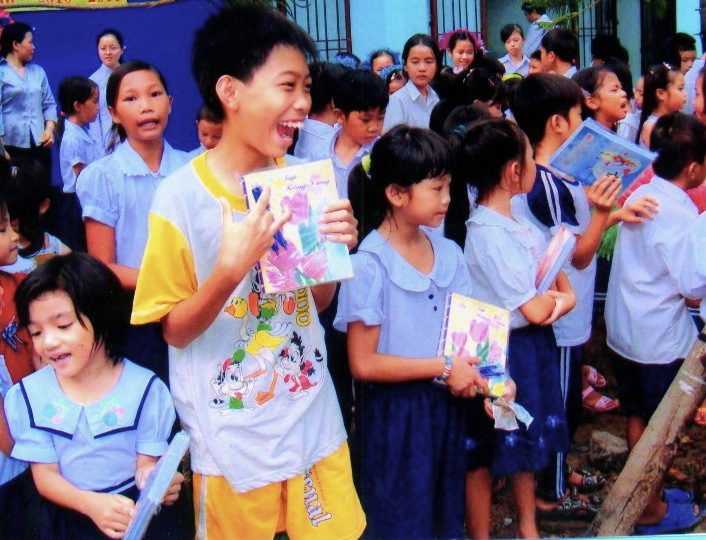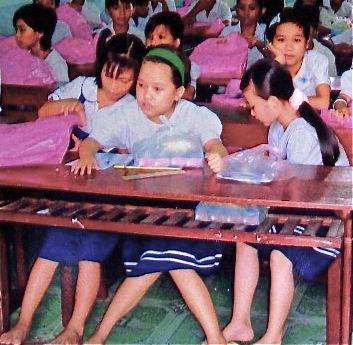
It was in the factory town of Saint-Quentin, France, that Fr. Leo John Dehon was first exposed to the plight of the working poor. It awakened him to the fact that the Church needs to do more than offer sacraments, its priests must “get out of the sacristy and go to the people,” he said.
Fr. Dehon’s words have come alive in Vietnam where the Priests of the Sacred Heart have partnered with St. Paul Parish near Ho Chi Minh City. The parish has much in common with the founder’s first parish assignment in Saint-Quentin. The population that surrounds it is made up primarily of factory workers and young migrant families. Many have come from the poorest areas of the country, seeking jobs and a better life near the city.
In 2008, the Priests of the Sacred Heart sent three seminarians to work with what Fr. Rino, SCJ, described as a “very Dehonian community.” St. Paul is not an SCJ parish, but the outreach that it does with the poor, especially the working poor, is reminiscent of Fr. Dehon’s work in Saint Quentin.
Fr. Rino is the local superior of the SCJ community in Vietnam. He described Binh Tan District, the area in which St. Paul’s is located, is described as a place where “the living conditions are very precarious. Salaries are low and workers cannot rely on a secure job.”
Many families have come to Binh Tan with their children in tow, but they cannot afford to send them to school. Books, uniforms and other necessities of a typical Vietnamese school are out of reach to these migrant families.
“The parents simply don’t send their children to school, hoping that some day their situation will be better,” said one SCJ.
The result is that many of these children spend the day on the streets. Some join gangs. “Without structure, they have nothing to do,” added the SCJ. “They put their lives at risk and can cause a great deal of trouble in the neighborhoods.”
The diocesan parish priest at St. Paul’s suggested to the parish council that the parish do something to reach out to these children.
In 2000 the parish rented a small parcel of land and put up four classrooms. Migrant parents were invited to send their children to the school. Through the amazing contribution of volunteer teachers –– Catholics from the area –– the street children were able to follow the same educational plan as students in government-operated schools.
The only payment the teachers receive is $75 to cover travel expenses.
The parish petitioned the government for support of Huong Tam School (“Huong Tam” means “Toward the future” in Vietnamese). As a rule, there are no private schools in the country; all fall under the government-run educational system.
Although Huong Tam did not receive financial support from the government, it did receive permission to operate. This in itself was a significant hurdle to cross.
Education officials periodically visit the school, sometimes bringing with them clothes for the students, and even baked treats. In 2008, the government accredited the school, which validates the graduation certificates of its students.

“The school is a beautiful social endeavor of the parish; it is very Dehonian,” said an SCJ who visited the school. “All of the teachers are Catholic, but only about 10 percent of the students are. It is a way for the Church to reach out to the wider community, to focus on the needs of these very poor children.”
Huong Tam operates at its capacity of 175 students in grades 1-5 at a total cost of $13,350 a year. Among its volunteer staff are two newly ordained SCJ deacons who teach English.
Recently, the U.S. Province committed to funding the school for three years.
“The school easily fits into the mission of our religious community,” said Fr. Tom Cassidy, SCJ, provincial superior. “For what it would cost to send a few children to a parish school in the United States we are able to educate a whole school of children in Vietnam,”
“This commitment from the U.S. Province is a great help not only to the Huong Tam School but to the parish as well,” said Fr. Rino. “Now the funds that were used for the school can go to many of the other social needs of the area, including job training.
“It is exciting to be a part of a project that is so closely aligned with the early works of the founder.”


